The core voltage is different for each processor model, and while all CPUs of the same model have the same VID, not all samples maintain stability at the same clock speeds and Vcore due to slight variations in silicon quality. Every sample of the same CPU model is tested to maintain stability at the default speeds and the VID determined by the manufacturer.
Core voltage typically maintains a constant value while your CPU is in use; however, sometimes under heavy workloads vcore can fluctuate. This is known as Vdroop and can be corrected with load-line calibration. This applies additional voltage as load increases to maintain your CPU's stability.
When it comes to overclocking, you can only push your CPU's frequency so far before your CPU starts to experience instability. Programs might begin to crash or hang up, game performance could suffer or your computer could even fail to boot. This is because your processor isn't getting enough voltage to maintain system stability.
Increasing voltage will allow you to dial in the perfect overclock.
To adjust the voltage, you'll need to boot into your motherboard's BIOS and make adjustments there. The Vcore is expressed as a three decimal value, such as 1.235v. By default, the voltage control is set to auto; this can be overridden by typing in any value. Make sure not to exceed the recommended maximum for your processor.
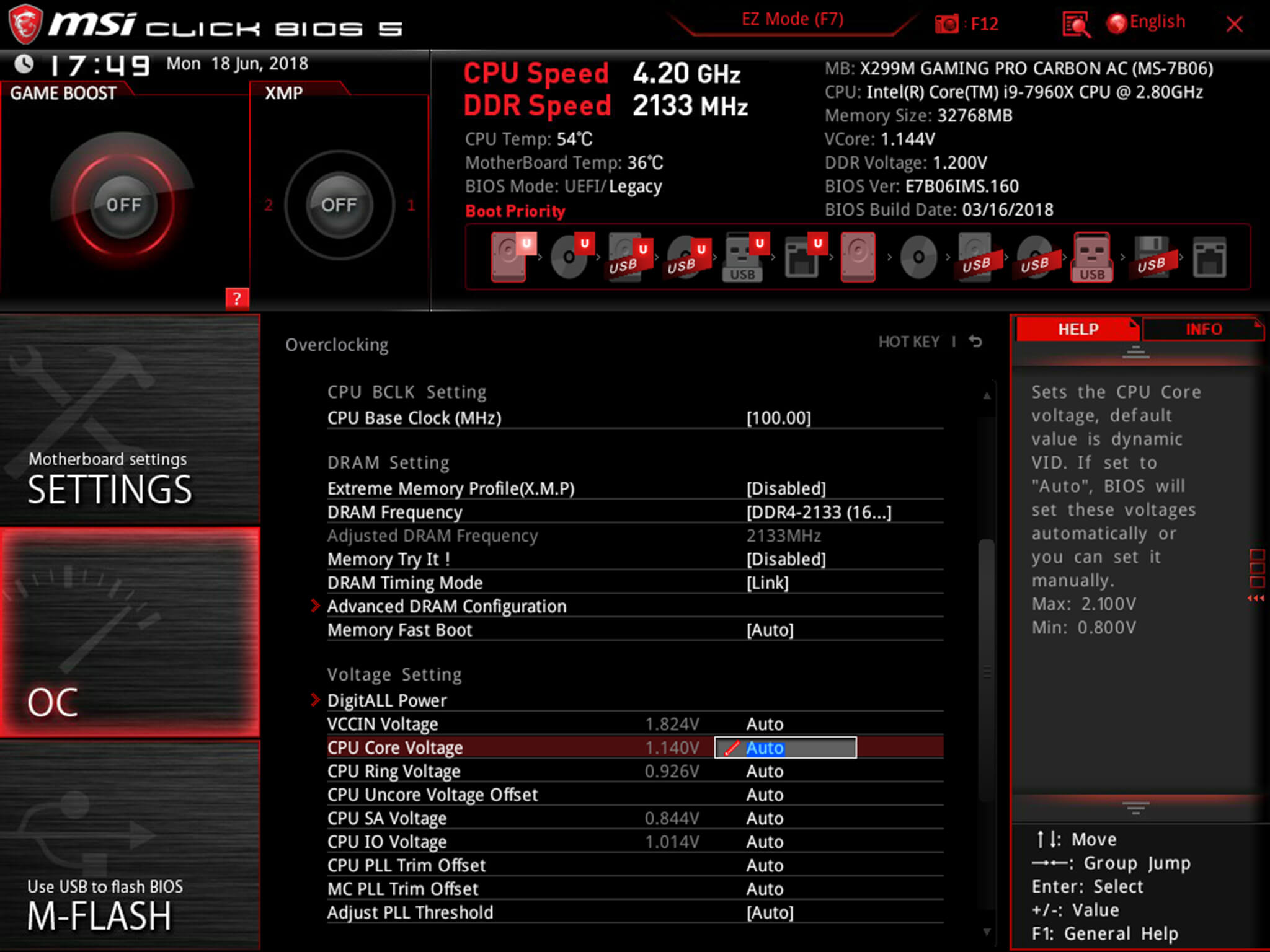
Before fine-tuning the Vcore, it's important to find a good baseline value for a given speed. This varies from model to model but it can be helpful to read reviews for your CPU, specifically ones that focus on overclocking.
Most publications will list the voltage they required to keep several different speeds stable. Every CPU sample is different and you will need to fine-tune the voltage before calling it done; however, these values do provide a good starting point.
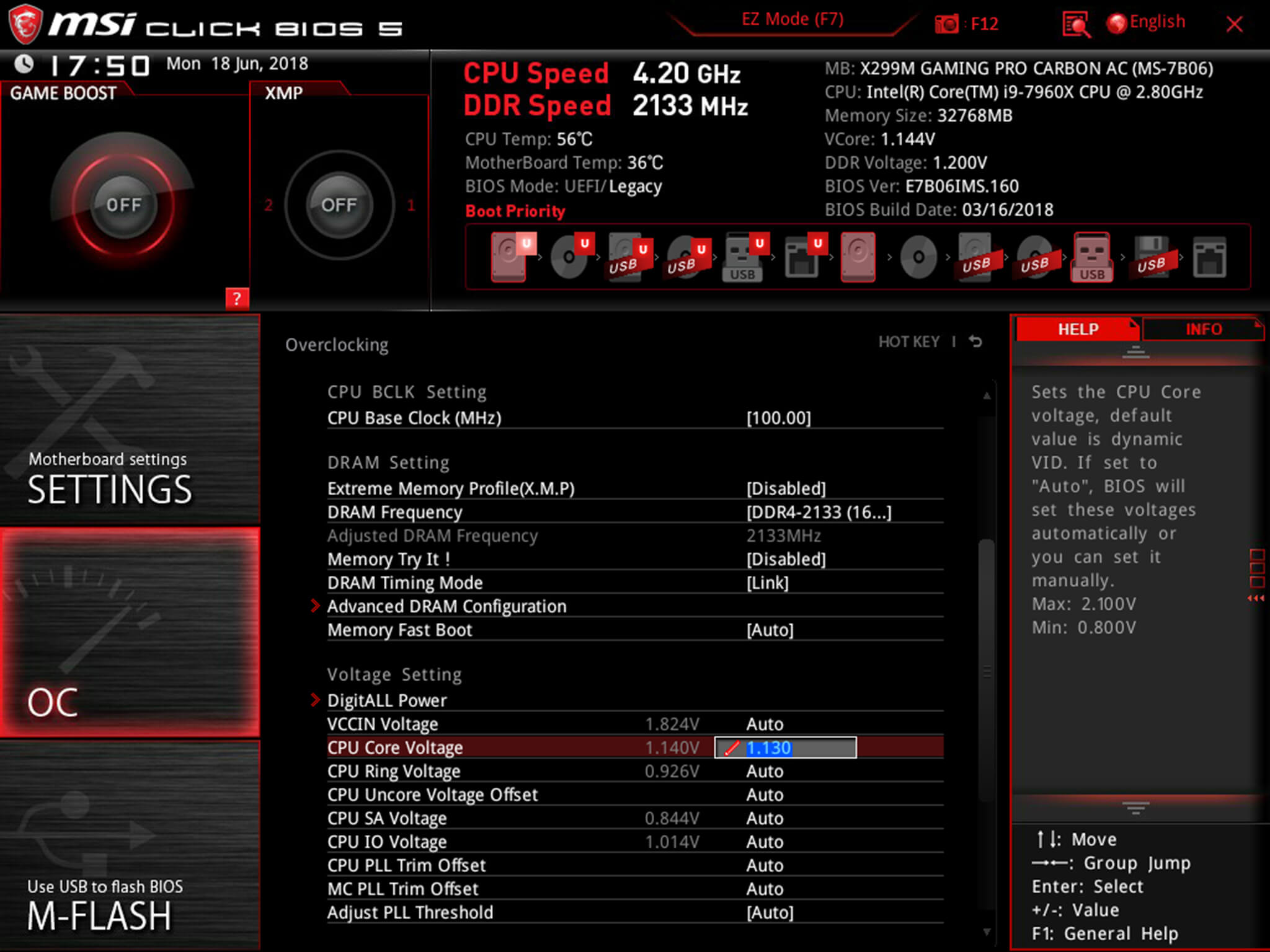
If you boot your machine and don't find any stability issues, then you know it's time to start decreasing the voltage. When overclocking, you want to find the lowest voltage required to maintain stability. More voltage equals more heat and this will allow you to keep temperatures under control.
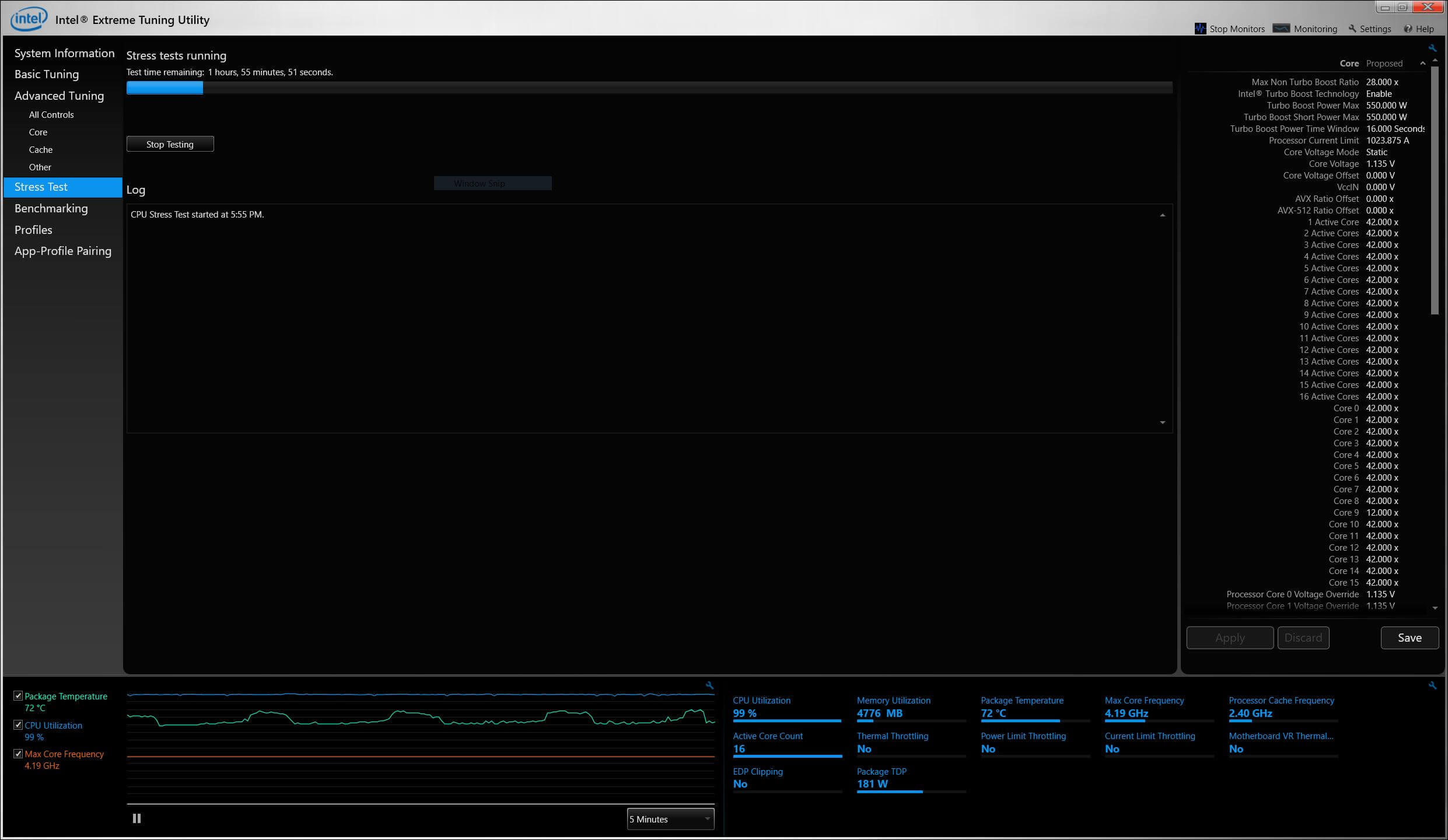
The safest way to adjust voltage is with increments of .01 volts. Decrease voltage until your computer starts showing signs of instability under load. Use a program like Intel's Extreme Tuning Utility (XTU) or Prime95 to stress test your processor.
If the test fails or crashes, then you need to raise the voltage back up to the previous stable point. For optimal efficiency, you can increase the voltage by .005 instead and again test for stability.
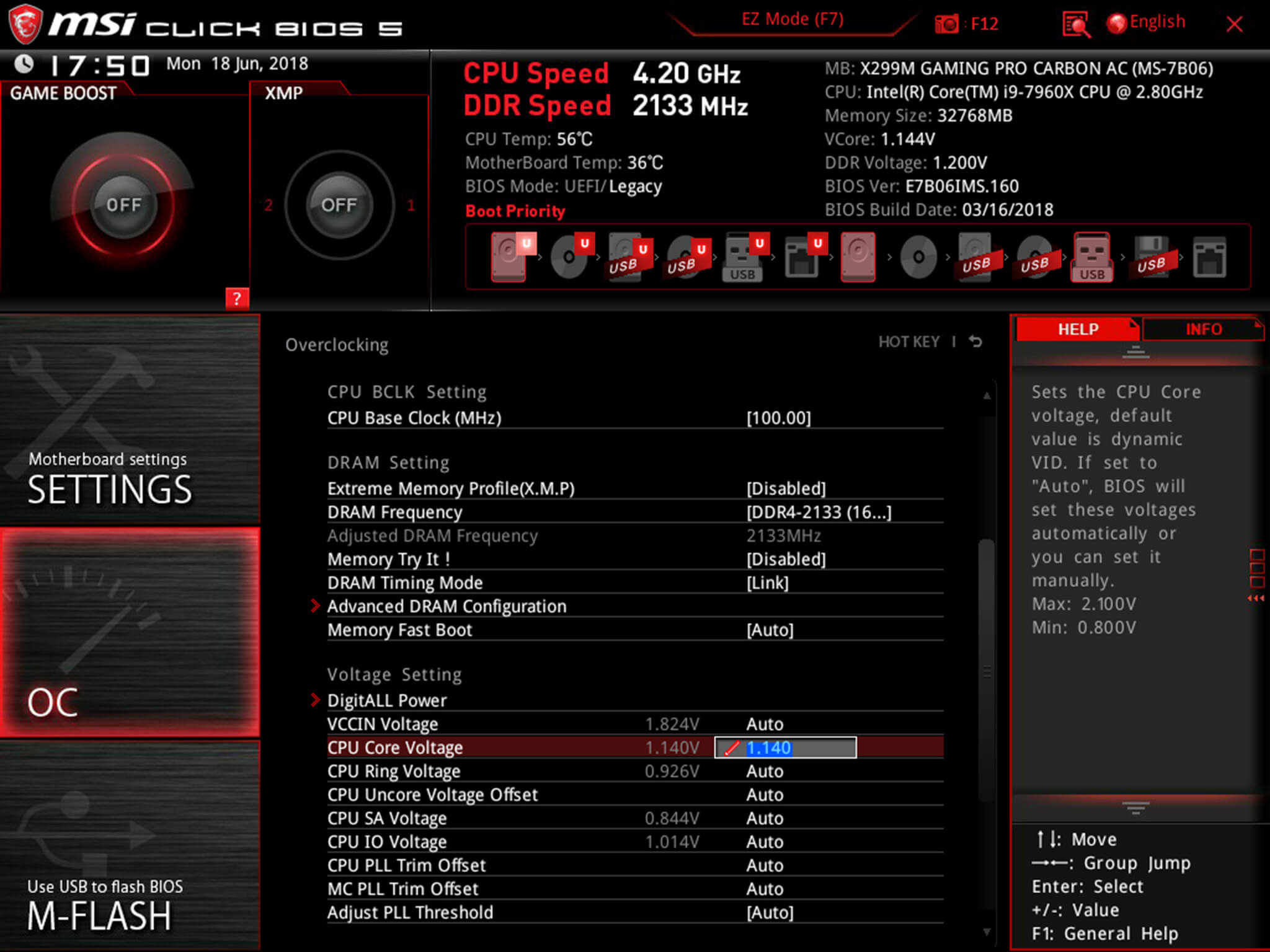
Conversely, if your overclock isn't stable at your baseline voltage, you will then need to increase the voltage until your computer shows no adverse effects and then decrease in increments of .005 to fine tune.
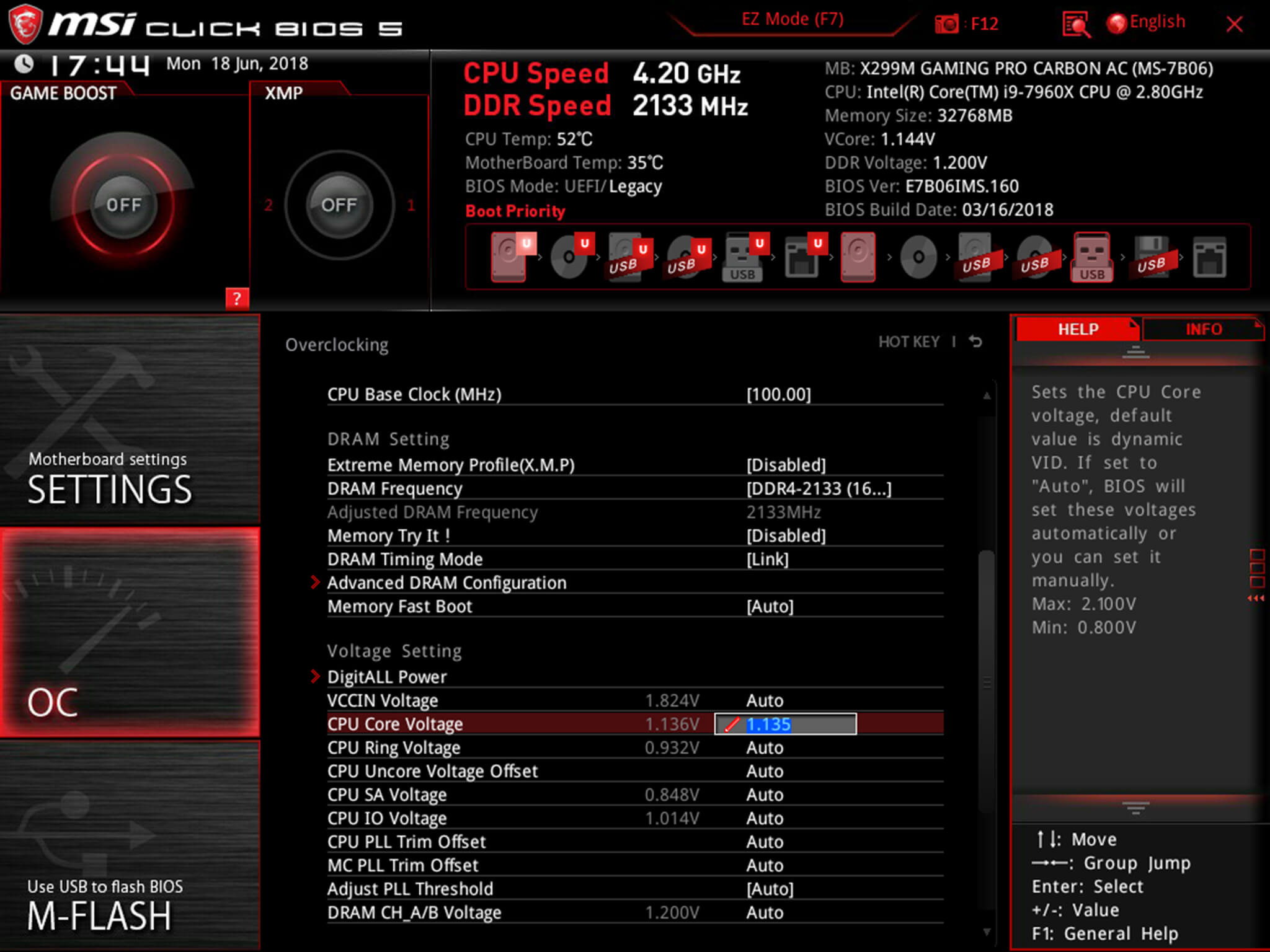
Overclocking is not the only time it can be useful to adjust voltage. As mentioned, higher voltage levels cause your CPU to generate more heat, regardless of frequency. Some CPU samples may have a higher VID than is actually required at the default frequency. Undervolting your processor allows your to maintain stability while decreasing temperatures and extending the life of your processor.
It's a common misconception that disabling Turbo Boost is a more effective substitute for shedding heat. While this does result in decreased temperatures, it is not an alternative as the purpose of undervolting is to maintain the same level of performance while generating less heat. When making adjustments, the same principles apply here as with overclocking, decrease Vcore in increments of .01 and then fine tune with adjustments of .005.
 Trump tells '60 Minutes' that climate change will 'change back again'
Trump tells '60 Minutes' that climate change will 'change back again'
 The 34 best Instagram accounts to capture your hearts
The 34 best Instagram accounts to capture your hearts
 Bear cam highlights are the best coronavirus activity
Bear cam highlights are the best coronavirus activity
 Stanley Hudson from 'The Office' is a Nap Icon we should cherish
Stanley Hudson from 'The Office' is a Nap Icon we should cherish
 Best robot vacuum deal: Get the Shark Matrix Plus 2
Best robot vacuum deal: Get the Shark Matrix Plus 2
 Hard Mountain Dew LiveWire review: A nostalgic new flavor is too much of a good thing
Hard Mountain Dew LiveWire review: A nostalgic new flavor is too much of a good thing
 Creighton vs. NC State March Madness livestream: How to watch live
Creighton vs. NC State March Madness livestream: How to watch live
 Saint Mary's vs. VCU livestream: How to watch the March Madness matchup live
Saint Mary's vs. VCU livestream: How to watch the March Madness matchup live
 The Made in America iPhone: How much would it cost?
The Made in America iPhone: How much would it cost?
 'Quordle' today: See each 'Quordle' answer and hints for March 21
'Quordle' today: See each 'Quordle' answer and hints for March 21
 'Severance' puts a spin on the Orpheus and Eurydice myth in its Season 2 finale
'Severance' puts a spin on the Orpheus and Eurydice myth in its Season 2 finale
 Apple's iPhone 15 Pro Max might break the record for thinnest bezels
Apple's iPhone 15 Pro Max might break the record for thinnest bezels
 ChatGPT is down. What we know.
ChatGPT is down. What we know.
 San Diego State vs. Furman live stream: How to watch March Madness
San Diego State vs. Furman live stream: How to watch March Madness
 March Madness: How to watch the Sweet 16 NCAA Men's Basketball livestreams
March Madness: How to watch the Sweet 16 NCAA Men's Basketball livestreams
 What is sargassum? The giant blob of seaweed hitting Florida
What is sargassum? The giant blob of seaweed hitting Florida
 HustleGPT is a hilarious and scary AI experiment in capitalism
HustleGPT is a hilarious and scary AI experiment in capitalism
 Best Apple TV+ deal: Get 3 months for $2.99 monthly
Best Apple TV+ deal: Get 3 months for $2.99 monthly
 Twitter silent as hackers scam users with stolen high
Twitter silent as hackers scam users with stolen high
Guess which other 'Star Wars' movie had wild alternate endings? 'Star Wars'How to use Twitter's new word muting featuresEthereum: The notDrawings of alleged Samsung Galaxy Note 8 design and specs leakGoogle is working on a new social app for editing photos'The Handmaid's Tale' trailer is getting a lot of people talking about Donald TrumpGoogle is working on a new social app for editing photosWikiLeaks reveals someone at the CIA really, really likes 'Doctor Who'MashTalk: Will the new electronics ban affect your travel plans?Facebook reaction GIFs could soon finally be a thingCan the CIA hack your iPhone? What you need to know about the WikiLeaks dump.Cracker Barrel got trolled hard by Facebook users seeking justice for a woman's firingTwitter hails 'braveheart' mother who jumped on a leopard to save her sonTwitter turns a discriminatory hashtag (on a blank page) into LOLsPizza guy rescues lost dog during cutest food delivery everPorsche's cash bonanza for every employee will make you wish you worked thereHow MealPal plans to outlive the subscription service hypeSo it turns out Shaq doesn't actually believe the Earth is flatAdele freaks out midMashTalk: Will the new electronics ban affect your travel plans? NASA fits 265,000 galaxies into a single ‘Hubble Legacy Field’ image Facebook's cryptocurrency plans may be more ambitious than we thought Jack Dorsey hangs out in an EMF Young people are overconfident with online security, survey suggests FTC split on punishing Mark Zuckerberg in settlement with Facebook Samsung to Fold buyers: Are you sure you want to keep your order? 'Spider 'Game of Thrones' Episode 4 recap: A disappointing middle 'Uno' wants you to stop pulling this illegal, but diabolical move Why Varys will definitely betray Daenerys on 'Game of Thrones' In 'Fortnite,' a volcano erupted and a whole city was wiped out Hillary Clinton spotted living her best life at Rhode Island bookstore Facebook managed to screw up its ban on 'dangerous' individuals Bloomberg report outlines tons of upcoming iOS and watchOS features Donald Trump is selling a $150 Christmas ornament OnePlus 7 ad drops the phone in water, but you still shouldn't Kid Cudi publicly thanks collaborators and industry peers in touching letter Being sexist can be bad for a man's psychological health, too Tesla cars are now better at keeping you in your lane Under Trump, dark days ahead for net neutrality and the open internet
2.0751s , 10133.3359375 kb
Copyright © 2025 Powered by 【Zoe Voss Archives】,Openness Information Network